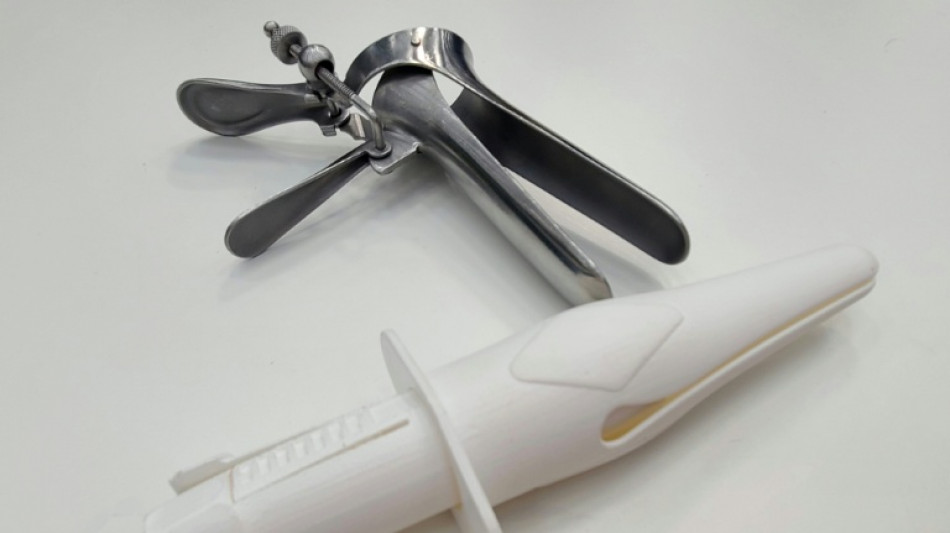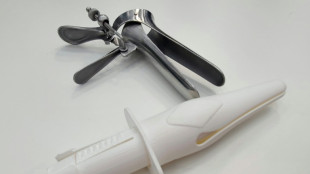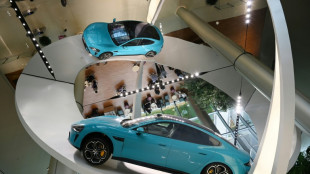
-
 Trump expected to outline Ukraine weapons plan
Trump expected to outline Ukraine weapons plan
-
UK to roll out red carpet for second Trump state visit

-
 89 killed as Syria sectarian clashes rage
89 killed as Syria sectarian clashes rage
-
Japan's World Barber Classic tries to bring back business

-
 Archer strikes as England eye stunning third Test win over India
Archer strikes as England eye stunning third Test win over India
-
Zelensky talks air defence in 'productive' meeting with US envoy

-
 Deadlocked Gaza truce talks limp on but US hopes for deal
Deadlocked Gaza truce talks limp on but US hopes for deal
-
Stocks diverge after Trump's latest tariff warning

-
 New UK weather records being set 'very frequently': report
New UK weather records being set 'very frequently': report
-
German doctor goes on trial for 15 murders

-
 Syria deploys forces after dozens killed in Bedouin-Druze clashes
Syria deploys forces after dozens killed in Bedouin-Druze clashes
-
Spain the stars as Women's Euro 2025 heads into knockouts

-
 Researchers redesign vaginal speculum to ease fear and pain
Researchers redesign vaginal speculum to ease fear and pain
-
EU climate VP seeks 'fair competition' with China on green energy

-
 Pilot groups reject claims of human error in Air India crash
Pilot groups reject claims of human error in Air India crash
-
Mexican voice actors demand regulation on AI voice cloning

-
 Wallaby Suaalii says Lions memories inspired his code change
Wallaby Suaalii says Lions memories inspired his code change
-
European markets drop after Trump's latest tariff warning

-
 Rescued German backpacker details Australia bush ordeal
Rescued German backpacker details Australia bush ordeal
-
Iraqis face difficult return from Syria camp for IS families

-
 France's military pigeons race in memory of brave predecessors
France's military pigeons race in memory of brave predecessors
-
Lions call up Ireland prop Clarkson and Scots trio as cover

-
 Hong Kong court hears appeals by jailed democracy campaigners
Hong Kong court hears appeals by jailed democracy campaigners
-
China exports beat forecasts in June after US tariff truce

-
 China exports soared in June, beating forecasts: official data
China exports soared in June, beating forecasts: official data
-
Australia stumble to 99-6 as Joseph leads West Indies fightback

-
 Asian markets mostly rise on lingering trade deal optimism
Asian markets mostly rise on lingering trade deal optimism
-
German 'doctor death' goes on trial for 15 murders

-
 Ireland prop Clarkson called up by Lions as front row cover
Ireland prop Clarkson called up by Lions as front row cover
-
'Las Vegas in Laos': the riverside city awash with crime

-
 Tesla to offer shareholders chance to invest in xAI: Musk
Tesla to offer shareholders chance to invest in xAI: Musk
-
Excavations begin at child mass grave site in Ireland

-
 EU ministers weigh response to latest Trump tariff threat
EU ministers weigh response to latest Trump tariff threat
-
Hong Kong court to hear appeals by jailed democracy campaigners

-
 'Severance' vs 'The Pitt' -- it's Emmy nominations time
'Severance' vs 'The Pitt' -- it's Emmy nominations time
-
US conducts military exercises at Panama Canal

-
 Chelsea boss Maresca hails 'great triumph' in winning Club World Cup
Chelsea boss Maresca hails 'great triumph' in winning Club World Cup
-
Macron to raise defence targets, citing Russia threat

-
 Club World Cup final scuffle 'should have been avoided' says Luis Enrique
Club World Cup final scuffle 'should have been avoided' says Luis Enrique
-
Michael Jordan's First Comeback Victory Sneakers with Photo Match Proof Could Be Yours

-
 AYRO, Inc. Regains Nasdaq Compliance
AYRO, Inc. Regains Nasdaq Compliance
-
Driver Technologies COO and Co-Founder Marcus Newbury Named Winner of 2025 Insurance Business America Rising Star Awards

-
 Unusual Machines Announces Pricing of $48.5 Million Registered Direct Offering of Common Stock
Unusual Machines Announces Pricing of $48.5 Million Registered Direct Offering of Common Stock
-
WidePoint Awarded its Fourth Task Order under the Navy Spiral 4 Contract Vehicle for the Defense Counterintelligence and Security Agency

-
 General Enterprise Ventures Appoints Andrew Hotsko as Chief Operating Officer
General Enterprise Ventures Appoints Andrew Hotsko as Chief Operating Officer
-
DEXA Secures National FAA Waiver for Beyond Visual Line of Sight Drone Operations

-
 GreenPro Capital Corp Celebrates 12th Anniversary and 7 Years on NASDAQ with Unified Vision for “New Finance” and Real-World Asset (“RWA”) Innovation
GreenPro Capital Corp Celebrates 12th Anniversary and 7 Years on NASDAQ with Unified Vision for “New Finance” and Real-World Asset (“RWA”) Innovation
-
Fineqia's Bitcoin Yield ETP to Cross List on the Euronext Stock Exchange; Target 6% Yield from DeFi

-
 Epique Realty Expands into Commercial Sector with Launch of Elite 'CORE' Division
Epique Realty Expands into Commercial Sector with Launch of Elite 'CORE' Division
-
Greenlane Selects JointCommerce as its B2C E-Commerce Digital Marketing Platform


Researchers redesign vaginal speculum to ease fear and pain
It is cold, hard, metallic and commonly associated with pain. Not a mediaeval torture instrument, but the vaginal speculum used every day around the world for essential gynaecological exams.
Two engineers at Delft University in the Netherlands are now rethinking the decades-old design of the speculum -- long dreaded by many patients -- to make it less intimidating and less painful.
"I have a lot of experience with the vaginal speculum, unfortunately," Tamara Hoveling, one of the researchers behind the project, told AFP.
"I've never seen it as a pleasurable experience and I've always wondered why it looks like this."
- Sombre history -
The PhD candidate in medical industrial design then delved into the dark history behind the creation of the speculum, one version of which was developed by United States doctor James Marion Sims 180 years ago.
It was "tested on enslaved women without permission", said the 29-year-old.
"So that motivated me even more to take on this project."
Hoveling teamed up with Ariadna Izcara Gual, who was then working on her master's in industrial design engineering at Delft.
"As I was doing a lot of interviews, I was doing those sort of sketches with the same sort of shape but people were still scared of the device", said the 28-year-old Spanish researcher.
The Cusco speculum, the most commonly used model, is a metal device with a handle, beak and screw to adjust how wide it opens once inside the vagina.
For many, its insertion is uncomfortable or even painful and causes anxiety.
"Then the speculum is opened, pushing against these tense muscles and making it even more painful," Hoveling said.
"So I tried to look for shapes that might be related to the reproductive organs, like for example the flower, that also opens."
- Patient-friendly design -
The result was a prototype called the Lilium -- named after the lily flower.
Like the more familiar tampon, it has soft plastic and an applicator.
"It's designed with the patient in mind rather than the doctor.
"And we're really trying to improve the comfort aspect in a sensitive spot."
The Lilium also meets doctors' needs. Its three-sided opening keeps the vaginal walls from collapsing, allowing better visibility during examinations.
The Lilium remains at an early stage, with further ergonomic testing and material research needed to refine the prototype.
The researchers must still secure safety certifications, run human trials and obtain regulatory approval before it can reach clinics.
- Dazzling success -
To fund the next phase, they launched a crowdfunding campaign that quickly drew media attention in the Netherlands.
Within just two days, the campaign raised 100,000 euros ($117,000) -- far surpassing expectations.
"It's also a sign. It's proof there are people who really want change, that there is a real problem here and that the current market solutions are not the best," Hoveling said.
"I've received a lot of emails from women who told me they actually don't go to the gynaecologist because of this device, because they're scared, because they have a traumatic experience."
Cervical cancer is the fourth most common cancer among women, according to the World Health Organization.
It can be detected via a smear test or HPV screening -- both performed using a speculum.
With funding to allow this new gynaecological tool to be developed properly, the Lilium could be saving lives within five years.
H.E.Young--AMWN